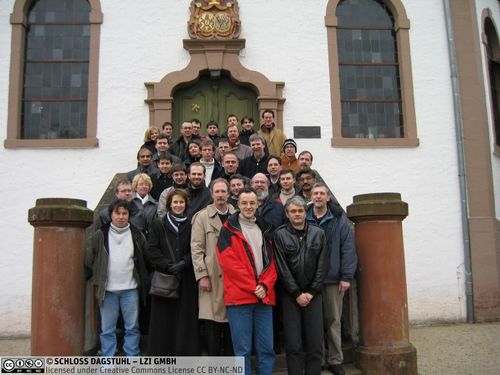Dagstuhl Seminar 03071
Emerging Technologies: Can Optimization Technology meet their Demands?
( Feb 09 – Feb 14, 2003 )
(Click in the middle of the image to enlarge)
Permalink
Please use the following short url to reference this page:
https://www.dagstuhl.de/03071
Organizers
- Thomas M. Conte (North Carolina State University, US)
- Christine Eisenbeis (University of Paris South XI, FR)
- Mary Lou Soffa (University of Virginia, US)
Contact
The talks at this seminar on optimization generally focused on 5 topics: program analysis, code optimization, dynamic analyis and optimization, new infrastructures for compilers, and embedded systems/architectures. The underlying questions during the seminar were (1) whether the issues and techniques presented were actually new or only rephrasements and rediscoveries of prior work and (2) what is realistically feasible in the next 5 - 10 years.
With this respect three panels were organized:
- Program analysis:
- static? dynamic?
Discussion Report - Embedded processors:
- do they provide the compiler community with new challenges? Some participants argued that new criteria have now to be taken into account such as power saving, code size, WCET. Hand coding is common practice in embedded systems. The fact that embedded architectures are less symmetric makes the code generation process tightly coupled with the optimization process. Also data transfers between memories must be managed by the compiler. But are new optimization techniques needed or are can we modify existing ones to accommodate the needs of embedded system software. There seems to be a lack of transfer of information or know-how between different generations of researchers and the compiler and embedded communities. There was also a question of whether optimization had developed enough that a scientific foundation could be laid and used with embedded systems. There was concern expressed about the difficulty of teaching optimization because material is spread across many different venues. One participant argued that researchers should write books on optimizations.
- Dynamic program optimization:
- Is dynamic program optimization the best way and the only way to go beyond the limits of the traditional static optimization? Also, what form should dynamic optimization take? The discussion was fairly negative about the overhead of on the fly analysis and optimization. It was argued that its utility clearly depends on the mobility and adaptability requirements of the code and on the behavior of a program. Which are the actual performance improvements that can be expected from these methods? Performing run time optimization is actually designing a new run time process that could be considered as a "software processor", very much like out-of-order processors that have "dynamic optimization" features. The central question is, therefore, where to place the frontier between the program and the runtime system.
Apart the panels, the trends that we can identify after this seminar are:
- a trend to consider the system (program, processor, compiler) from outside, analyse it very much like a biological entity (by running systematic experiments and analyse performance curve or graphics), observe its reactions to stimuli (iterative compiling methods are such an observation system)
- great need and trend to go towards formal methods, not only for safety critical systems but also for generating stable (bug free) optimizing compilers for ordinary processors.
- great need that compilers and architects communicate, especially in the domain of embedded systems.
- Vikram S. Adve (University of Illinois - Urbana-Champaign, US) [dblp]
- Uwe Aßmann (TU Dresden, DE) [dblp]
- Francois Bodin (INRIA - Rennes, FR)
- Zbigniew Chamski (Philips Research Europe - Eindhoven, NL)
- Philippe Clauss (University of Strasbourg, FR) [dblp]
- Josep M. Codina (UPC - Barcelona, ES)
- Albert Cohen (UPMC - Paris, FR) [dblp]
- Thomas M. Conte (North Carolina State University, US) [dblp]
- Keith D. Cooper (Rice University - Houston, US)
- Henk Corporaal (IMEC - Leuven, BE)
- Alain Darte (ENS - Lyon, FR) [dblp]
- Jack W. Davidson (University of Virginia, US) [dblp]
- Oege de Moor (University of Oxford, GB)
- Alexander G. Dean (North Carolina State University, US)
- Evelyn Duesterwald (IBM TJ Watson Research Center - Yorktown Heights, US)
- Christine Eisenbeis (University of Paris South XI, FR)
- M. Anton Ertl (TU Wien, AT)
- Peter Faber (Universität Passau, DE)
- Basilio B. Fraguela (University of A Coruña, ES)
- Michael Franz (University of California - Irvine, US) [dblp]
- Thomas Gross (ETH Zürich, CH) [dblp]
- Ulrich Hirnschrott (TU Wien, AT)
- Peter Knijnenburg (Leiden University, NL)
- Jens Knoop (TU Wien, AT) [dblp]
- Sylvain Lelait (Atair Software GmbH - Wien, AT)
- Christian Lengauer (Universität Passau, DE) [dblp]
- Willem Mallon (Philips Research Europe - Eindhoven, NL)
- Peter Marwedel (TU Dortmund, DE) [dblp]
- Benoit Meister (University of Strasbourg, FR) [dblp]
- David Padua (University of Illinois - Urbana-Champaign, US)
- Lawrence Rauchwerger (Texas A&M University - College Station, US) [dblp]
- Sergei Schwenk (TU Dortmund, DE)
- Gabriel M. Silberman (IBM TJ Watson Research Center - Hawthorne, US)
- Viera Sipkova (TU Wien, AT)
- Mary Lou Soffa (University of Virginia, US)
- Bernhard Steffen (TU Dortmund, DE) [dblp]
- Sid Ahmed Ali Touati (University of Versailles, FR)
- Ludo Van Put (Ghent University, BE)
- Christoph von Praun (IBM TJ Watson Research Center - Yorktown Heights, US) [dblp]
- Reinhard Wilhelm (Universität des Saarlandes, DE) [dblp]
- Sebastian Winkel (Intel - Santa Clara, US)
- Sudhakar Yalamanchili (Georgia Institute of Technology, US)


